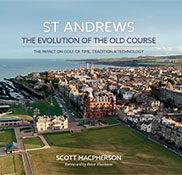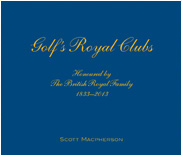GOLF CHAMPIONSHIPS ON SMGD COURSES:
At Close House – Colt Course. Sept 2017. A prestigious European Tour Championship hosted by Lee Westwood.
Broadcast worldwide from Royal Wellington Golf Club, NZ. October 2017. WOW!
The legacy continues.
Co-hosted at the award-winning Millbrook Resort near Queenstown, NZ. 2014 – 2023.
A Return to Prestwick
Published ‘The Cut’- July ‘03.
Every year in July my mind turns to the worlds’ oldest major golf tournament, the British Open- or as the traditionalists refer to it, the Open Championship. Every year I also entertain the fanciful idea of the Open returning to a place which has been all but forgotten by time and rejected by the event it begun; Prestwick.
The last time the Open was held at Prestwick was 1925 when 15 thousand spectators engulfed MacDonald Smith and distinguished his chances of winning the Claret Jug. Records claim that he was ‘jostled and hustled’ around the course, given very little room in which to swing a club and never saw the result of a long shot. Finishing up 4 shots behind eventual winner Jim Barnes, Smith returned to Carnoustie ‘tired, angry and embittered’.
That black day in Prestwick’s history would later ensure that the course which gave us the Open would never be asked to host it again. This sad consequence is a result of the fact that golfs worldwide popularly has taken the Open from an event once played for by 8 ‘known and respectable caddies’ in 1860, to a multimillion dollar extravaganza. But wouldn’t it be great to see the great players of today gather together to tackle this ancient monument?
Architecturally, Prestwick has three holes which have shaped the direction of golf course design. The 206y, Par 3, 5th hole known as the ‘Himalayas’ is a reminder of the adventurism of early golfers. Golf was a test of ingenuity, in getting around difficulties and overcoming new and unexpected situations. A blind hole over a high sand dune ridge, to a guarded green was the consummate test.
Equally, the Par 4, 397y, 17th hole is known as the ‘Alps’ and was described by Golf Architect, Tom Simpson is 1929 as offering ‘attractive discord’ to a round at Prestwick. It was considered a fun hole that gave mental relief before the final test. However, requiring a long accurate tee shot between imposing sand dunes before a blind approach shot over another large dune and hidden bunker to an unusually steep green requires the most liberal definition of the word ‘relief’.
The final hole of great note is the Par 5, 505 yard, 3rd hole known as the Cardinal. It has been rated by The Golfers Handbook, with the Road Hole at St Andrews as the ‘two most famous holes in world golf’. While the Road Hole is now a Par 4 and infinitely more well known, the Cardinal remains as perplexing, terrifying and exciting today as it was in 1882 at 436 yards long. In subconsciously admitting its beauty, American Dan Jenkins described it in 1970 as a hole he would like to gather up and mail to his top 10 enemies. With a large bunker, complete with steep face and railroad sleepers, defending the landing area, long hitters must lay up before negotiating the narrow and winding path of grass moguls to the small, undulating green. Harry Vardon described the Cardinal in 1905, as ‘… one that stirs the soul of the daredevil golfer.’

Golf Professionals generally dislike holes like these because they invoke too many elements of luck – despite how richly meritorious they actually are. Competitive play seems to sway a players’ preference away from chance and in favour of equity and predicability – which can be much against the spirit of the game. Fortunately Prestwick has not bowed to such ill conceived views. It has maintained its virtues and whilst no longer on the Open rota, the course still holds numerous amateur events and plays competitively at a respectable 6,724 yards.
Prestwick may be a ‘museum piece’ and ‘old fashioned’ as described by some, but it has an enviable antiquity that will keep it at the top of the list of worlds most important courses. As for the Cardinal, I’m sure he’ll be watching the Open this year and have a spiritual effect on events come Sunday.
AWARDS
 Winner
Winner
Excellence in Compliance Award
Royal Wellington Golf Club
 Scott awarded by GEO as a Sustainable Golf Champion
Scott awarded by GEO as a Sustainable Golf Champion
PUBLICATIONS
 St Andrews
St Andrews
The Evolution of the Old Course
by Scott Macpherson
TESTIMONIALS
"When I was looking for a golf architect I wanted someone who would understand the landscape and have the flair to design a course of the highest quality in terms of; aesthetics, a player's and playing perspective; being practical in terms of forward maintenance; and to bring the construction in on time and on budget. Scott is that man! And what's more he brings competence and professionalism and an easy management style and enthusiasm that is infectious and at no extra charge – a little bit of magic to it all!"
Derek Young, Chairman Kersewell Resort Group, Scotland, UK.



